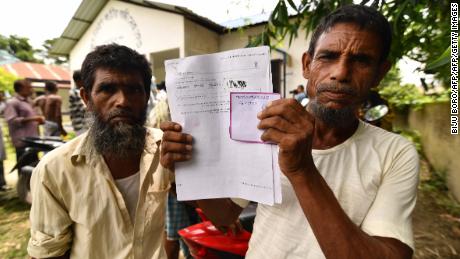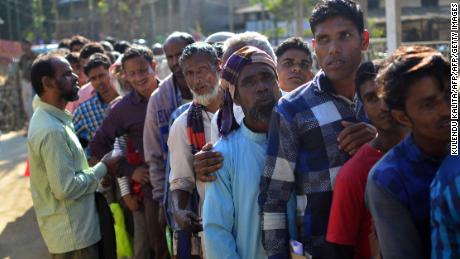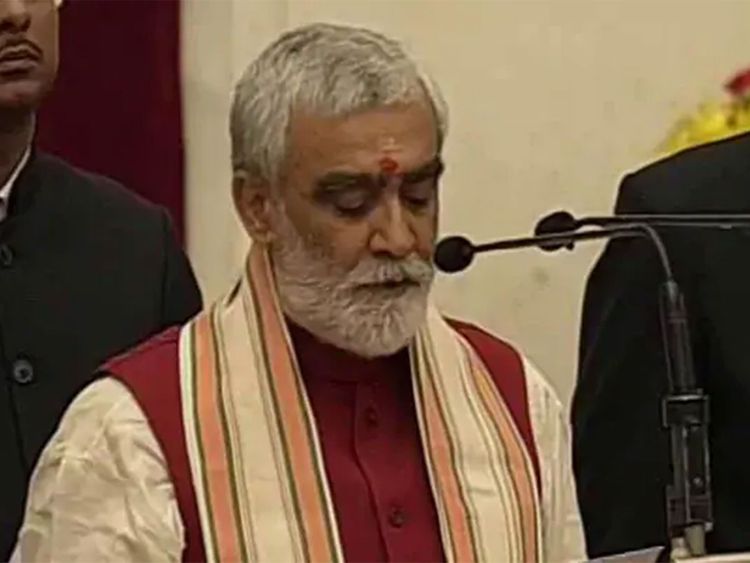continued ...
'We thought we were legally Indian'

A resident holds documents on his way to check his name on the final list of National Register of Citizens (NRC) in Kuranibori village, in Assam's Morigoan district on July 30, 2018.
Some families say they were left off the draft list while their relatives were included.
Sanjay Sammanit, a private tutor in Dumuria village in Assam, said his wife was the only one of his family on last year's list. His parents, two older brothers, a younger brother and his daughter were left off.
His family has been in Assam since 1964, when his grandfather came to the state from Bangladesh, he says. "We thought we were legally Indian," he said in a phone interview.
"We were stressed because we received a notice saying that we had not submitted some of the legal documents required," he said. He is hopeful this time round, but worries about poorer families who will struggle to navigate the appeals process.
"Despite having documents, poor people have been made to go through so much. Many people in the villages are illiterate, they have to go to other people to fill up forms," said Chandan Dey, a 48-year-old shopkeeper from Dumuria, in Baksa district.
"There's lot of financial cost incurred and the places where the hearings take place can be some 50 to 150 kilometers away so you have to hire a car. People are suffering," he added.
Many like Dey say they have had trouble proving their citizenship to officials in numerous appeals hearings, despite having the required documents. He and nine other family members were left off the draft list.
"The same things are repeated again and again. We have submitted the same set of documents and they ask if we have any more. Had there been anything else, we would have brought it," he said. "We are old now. My father is on his deathbed. We are four or five generations in but still we might be foreigners? Is that logical?"
Munoth, the lawyer, said most exclusions from the NRC were happening because people didn't have the documentation.
"It's just unthinkable. If I was asked to prove my citizenship, I would be at pains to find a document that says my ancestors came to India before 1947 and this is me with my class and caste privilege and education. You can only imagine what a daily wage laborer would go through," she said.
CNN reached out to government officials in New Delhi and Assam to talk about problems with the process but has not received comment.
Immigration and Hindu nationalism
Prime Minister Narendra Modi's political opponents claim the exercise, which predated his administration by decades, is discriminatory against religious minorities.
The principal opposition Congress party said last year that it wasn't enough to allow people left off the list to file appeals. It called on Modi and his ruling Bharatiya Janata Party (BJP) to ensure that the process is fair -- and that it doesn't discriminate against people based on their religion, a concern voiced by many given Assam's multi-ethnic make-up.
Nazrul Islam, a 28-year-old Muslim from Assam's Baksa district, said he feels the NRC has been drawn on religious lines. He said around 40% of families in his Muslim-majority neighborhood were left off the draft list. "Our whole community is under extreme mental pressure," he said, adding that he feels his religion "has been targeted."
The registry comes amid mounting anger over illegal migration into Assam, which shares a porous border with Bangladesh. Just under two thirds of the far flung state's population is Hindu with a third being Muslim and the rest mainly Christian.
Long-standing tensions between Assam's indigenous people and the minority migrant Muslim settlers . In the biggest eruption in 1983, were killed in Assam by mobs intent on driving out Muslim immigrants.

Assam is the only state in India to have a citizenship register. Villagers in Assam stand in line to check their names on the first draft of NRC in 2018.
The decision to impose a state-wide register of citizens has drawn parallels with Myanmar's Rakhine State, where Rohingya Muslims -- some of whom can trace their ancestry back to Bangladesh -- have long faced persecution. In 2017, hundreds of thousands of Rohingya were forced across the border into Bangladesh as part of a targeted campaign of ethnic cleansing labeled by the UN as genocidal.
Tensions over citizenship have been brewing for decades in Assam, but became an election issue for the ruling BJP earlier this year. The party's president Amit Shah rid the country of all "infiltrators" in an apparent swipe at undocumented Muslim migrants.
"We will remove every single infiltrator from the country, except Buddhists, Hindus and Sikhs," Shah told supporters in West Bengal, which also borders Bangladesh, during a campaign in April. He promised to do so by implementing the National Registry of Citizens nationwide.
In addition to the NRC, a controversial India-wide Citizenship Amendment Bill introduced in 2016 would offer Indian citizenship to Hindus and other non-Muslim migrants from neighboring Muslim-majority countries of Bangladesh, Afghanistan and Pakistan. The BJP said it helped religious minorities fleeing persecution, but the bill's opponents insist it is anti-Muslim. It was passed in the lower house in January but failed in the upper house.
A Hindu nationalist party, the BJP has long faced accusations of anti-Muslim rhetoric, and as a country only for Hindus -- even with its population of more than 170 million Indian Muslims.
"(The NRC is) definitely buying into what the BJP said they would do when they came into power," said Munoth. "We've had leaders come out saying it will be followed in other parts of India. In fact, we have spoken to people who say that in Muslim areas, even in Delhi, the rumors are so strong that this is going to happen, that people have started collecting documents, that Muslims are living under the fear of when this will happen in their state."
With reporting from Subhrangshu Pratim Sarmah in New Delhi.
© 2019 Cable News Network.All Rights Reserved.CNN Sans ™ & © 2016 Cable News Network.
'We thought we were legally Indian'

A resident holds documents on his way to check his name on the final list of National Register of Citizens (NRC) in Kuranibori village, in Assam's Morigoan district on July 30, 2018.
Some families say they were left off the draft list while their relatives were included.
Sanjay Sammanit, a private tutor in Dumuria village in Assam, said his wife was the only one of his family on last year's list. His parents, two older brothers, a younger brother and his daughter were left off.
His family has been in Assam since 1964, when his grandfather came to the state from Bangladesh, he says. "We thought we were legally Indian," he said in a phone interview.
"We were stressed because we received a notice saying that we had not submitted some of the legal documents required," he said. He is hopeful this time round, but worries about poorer families who will struggle to navigate the appeals process.
"Despite having documents, poor people have been made to go through so much. Many people in the villages are illiterate, they have to go to other people to fill up forms," said Chandan Dey, a 48-year-old shopkeeper from Dumuria, in Baksa district.
"There's lot of financial cost incurred and the places where the hearings take place can be some 50 to 150 kilometers away so you have to hire a car. People are suffering," he added.
Many like Dey say they have had trouble proving their citizenship to officials in numerous appeals hearings, despite having the required documents. He and nine other family members were left off the draft list.
"The same things are repeated again and again. We have submitted the same set of documents and they ask if we have any more. Had there been anything else, we would have brought it," he said. "We are old now. My father is on his deathbed. We are four or five generations in but still we might be foreigners? Is that logical?"
Munoth, the lawyer, said most exclusions from the NRC were happening because people didn't have the documentation.
"It's just unthinkable. If I was asked to prove my citizenship, I would be at pains to find a document that says my ancestors came to India before 1947 and this is me with my class and caste privilege and education. You can only imagine what a daily wage laborer would go through," she said.
CNN reached out to government officials in New Delhi and Assam to talk about problems with the process but has not received comment.
Immigration and Hindu nationalism
Prime Minister Narendra Modi's political opponents claim the exercise, which predated his administration by decades, is discriminatory against religious minorities.
The principal opposition Congress party said last year that it wasn't enough to allow people left off the list to file appeals. It called on Modi and his ruling Bharatiya Janata Party (BJP) to ensure that the process is fair -- and that it doesn't discriminate against people based on their religion, a concern voiced by many given Assam's multi-ethnic make-up.
Nazrul Islam, a 28-year-old Muslim from Assam's Baksa district, said he feels the NRC has been drawn on religious lines. He said around 40% of families in his Muslim-majority neighborhood were left off the draft list. "Our whole community is under extreme mental pressure," he said, adding that he feels his religion "has been targeted."
The registry comes amid mounting anger over illegal migration into Assam, which shares a porous border with Bangladesh. Just under two thirds of the far flung state's population is Hindu with a third being Muslim and the rest mainly Christian.
Long-standing tensions between Assam's indigenous people and the minority migrant Muslim settlers . In the biggest eruption in 1983, were killed in Assam by mobs intent on driving out Muslim immigrants.

Assam is the only state in India to have a citizenship register. Villagers in Assam stand in line to check their names on the first draft of NRC in 2018.
The decision to impose a state-wide register of citizens has drawn parallels with Myanmar's Rakhine State, where Rohingya Muslims -- some of whom can trace their ancestry back to Bangladesh -- have long faced persecution. In 2017, hundreds of thousands of Rohingya were forced across the border into Bangladesh as part of a targeted campaign of ethnic cleansing labeled by the UN as genocidal.
Tensions over citizenship have been brewing for decades in Assam, but became an election issue for the ruling BJP earlier this year. The party's president Amit Shah rid the country of all "infiltrators" in an apparent swipe at undocumented Muslim migrants.
"We will remove every single infiltrator from the country, except Buddhists, Hindus and Sikhs," Shah told supporters in West Bengal, which also borders Bangladesh, during a campaign in April. He promised to do so by implementing the National Registry of Citizens nationwide.
In addition to the NRC, a controversial India-wide Citizenship Amendment Bill introduced in 2016 would offer Indian citizenship to Hindus and other non-Muslim migrants from neighboring Muslim-majority countries of Bangladesh, Afghanistan and Pakistan. The BJP said it helped religious minorities fleeing persecution, but the bill's opponents insist it is anti-Muslim. It was passed in the lower house in January but failed in the upper house.
A Hindu nationalist party, the BJP has long faced accusations of anti-Muslim rhetoric, and as a country only for Hindus -- even with its population of more than 170 million Indian Muslims.
"(The NRC is) definitely buying into what the BJP said they would do when they came into power," said Munoth. "We've had leaders come out saying it will be followed in other parts of India. In fact, we have spoken to people who say that in Muslim areas, even in Delhi, the rumors are so strong that this is going to happen, that people have started collecting documents, that Muslims are living under the fear of when this will happen in their state."
With reporting from Subhrangshu Pratim Sarmah in New Delhi.
© 2019 Cable News Network.All Rights Reserved.CNN Sans ™ & © 2016 Cable News Network.








